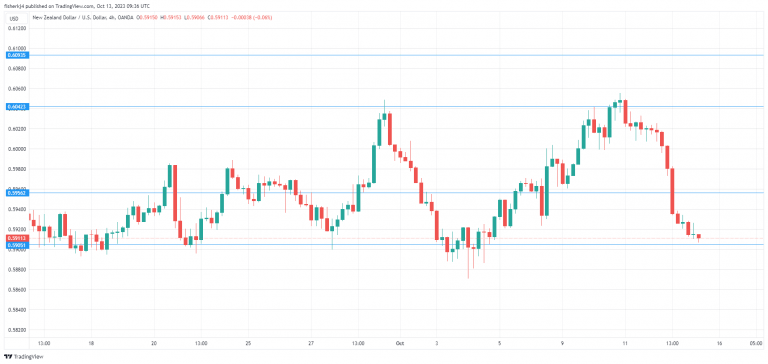New Zealand Dollar extends losses after plunge
-
US headline CPI higher than expected.
-
US jobless claims remain low.
-
New Zealand Manufacturing Index declines.

The New Zealand dollar is lower on Friday after a massive plunge a day earlier. In the European session, NZD/USD is trading at 0.5911, down 0.25%.
The US inflation report was stronger than expected, and the US dollar responded with sharp gains against the major currencies. Risk currencies were hit hard, and the New Zealand dollar plunged 1.56%, its worst one-day performance since May.
US inflation and employment reports on Thursday indicated that the economy remains resilient, despite elevated interest rates. US CPI was unchanged in September at 3.7% y/y, higher than the market estimate of 3.6% y/y. Core CPI fell from 4.3% to 4.1% y/y, matching the estimate. Although the core rate is a better gauge of inflation, investors focused on the headline reading, which raised concerns that the Fed will continue its “higher for longer” stance.
US unemployment claims pointed to a resilient labor market that has cracks but refuses to break. For the week ending October 7th, unemployment claims were unchanged at 209,000, below the estimate of 210,000. This is further evidence that the labour market remains very tight and provides further support for the Fed to remain hawkish and possibly raise rates before the end of the year.
The markets are leaning towards the Fed holding rates for the rest of the year but haven’t ruled out one more hike. The probability of a hike before the end of the year jumped to 38% after the inflation report but has fallen to 30%, according to the CME FedWatch Tool.
In New Zealand, the manufacturing sector can’t find its footing. The Business NZ Manufacturing Index contracted to 45.3 in September, down from 46.1 in September. This was a seventh straight decline and was the lowest reading since August 2021. A reading below the 50 level indicates contraction.
NZD/USD technical
-
NZD/USD is testing support at 0.5956. The next support level is 0.5905.
-
There is resistance at 0.6042 and 0.6093.
Author

Kenny Fisher
MarketPulse
A highly experienced financial market analyst with a focus on fundamental analysis, Kenneth Fisher’s daily commentary covers a broad range of markets including forex, equities and commodities.


















